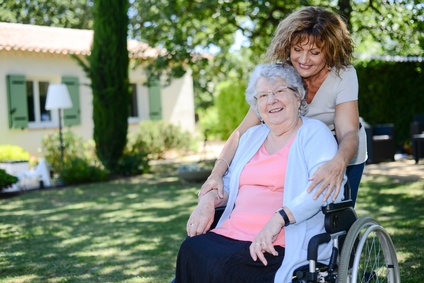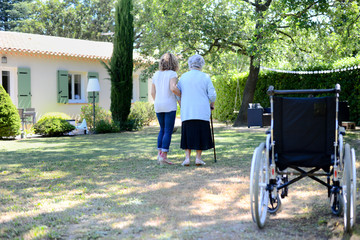In New Zealand, 43 percent of people love gardening – and it’s no surprise why. Gardening has been found to reduce stress and it reconnects you with nature, which can feel spiritual. It’s also so much fun to plant pretty flowers or create trendy desert landscapes and see them thrive. However, if you’re living with an ageing person or you have a relative who regularly visits, your pretty garden sanctuary can easily become a dangerous zone for them. Here’s what you need to know to keep your stunning space safe.
 The most important thing to do if your ageing parents or friends are popping around for a garden party later is to take a walk through the garden and look at it with new eyes. Are there any areas that look dangerous? One of the riskiest things a garden can have is slippery paving or pathways. Roughly one-third of mature people over the age of 65 experience a fall every year, so you want to be sure that there are no slippery areas. Clean away leaves or flowers that have fallen on paving or steps, and avoid watering the garden before guests have to arrive. Here are other tips to make your garden safe.
The most important thing to do if your ageing parents or friends are popping around for a garden party later is to take a walk through the garden and look at it with new eyes. Are there any areas that look dangerous? One of the riskiest things a garden can have is slippery paving or pathways. Roughly one-third of mature people over the age of 65 experience a fall every year, so you want to be sure that there are no slippery areas. Clean away leaves or flowers that have fallen on paving or steps, and avoid watering the garden before guests have to arrive. Here are other tips to make your garden safe.
Bolster your security
Focusing on personal safety is always good, but this is of particular concern if your relative has dementia or Alzheimer’s disease and can’t look after themselves. Increase your garden’s security by fixing any holes in the fence and keeping gates locked if the person likes to wander around so that they can’t end up leaving the property and going into the road.
Cover up
If you have a swimming pool or large pond, it could be a good idea to cover it up when ageing relatives are visiting. This prevents any freak accidents from happening, especially if the pond is integrated within your garden and is too accessible. It’s really easy for someone who walks unsteadily to trip and fall into it.
Keep it light
Ageing relatives popping around for sundowners? Make sure that all the pathways are lit up to guide their way. It’s also a good idea to have lights around borders or in areas of the garden where it’s easy to miss one’s step, such as places where the ground is a little uneven. Lights around beautiful large fountains in the garden are also important – if they can’t be seen, they’re really easy to bump into or cause a fall.
Create a sanctuary spot
Some mature people might get tired easily or have injuries that make them have to rest at regular intervals. That’s why it’s so important to have lots of seating areas in your garden, such as with scattered chairs or comfortable benches. Prop some cushions on them to make them even more inviting!
Safe gardening with ageing relatives
 There are many gardening benefits for ageing relatives, such as the chance to de-stress which reduces health conditions such as high blood pressure. However, you want their experience of gardening to be a pleasurable one that isn’t too strenuous for their age and/or fitness level. Building raised flowerbeds, such as with bricks, is a great idea so that mature relatives don’t have to bend too much when planting flowers. Replacing gravel and stone pathways for flat, solid ground is also safer, especially if your relative requires a walking stick or wheelchair to get around.
There are many gardening benefits for ageing relatives, such as the chance to de-stress which reduces health conditions such as high blood pressure. However, you want their experience of gardening to be a pleasurable one that isn’t too strenuous for their age and/or fitness level. Building raised flowerbeds, such as with bricks, is a great idea so that mature relatives don’t have to bend too much when planting flowers. Replacing gravel and stone pathways for flat, solid ground is also safer, especially if your relative requires a walking stick or wheelchair to get around.
The garden is a beautiful, happy place where you and your mature relatives can enjoy nature and perhaps even get your hands dirty planting flowers and vegetables together. But it can also be a dangerous zone where ageing relatives risk hurting themselves. By adopting some garden safety, such as stronger fencing and less gravel, you can ensure the garden remains a sanctuary.









john Anietie - 4 months ago
Woah! I’m really enjoying the template/theme of this site. It’s simple, yet effective. A lot of times it’s very hard to get that “perfect balance” between user friendliness and appearance. I must say you’ve done a fantastic job with this. In addition, the blog loads extremely quick for me. Outstanding Blog!